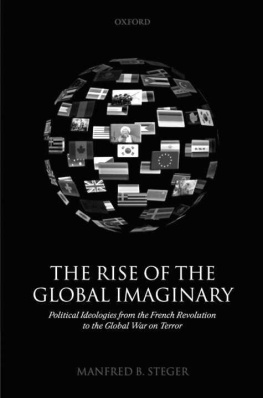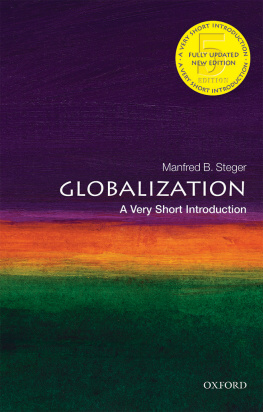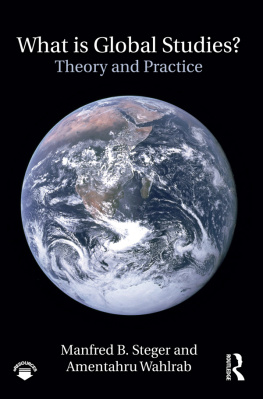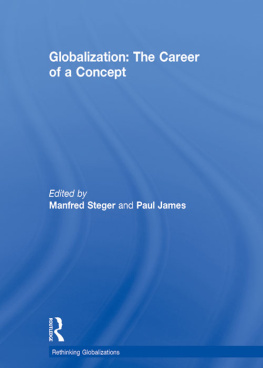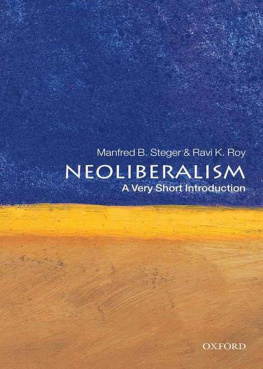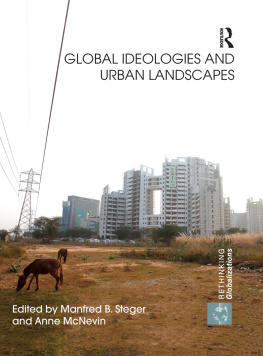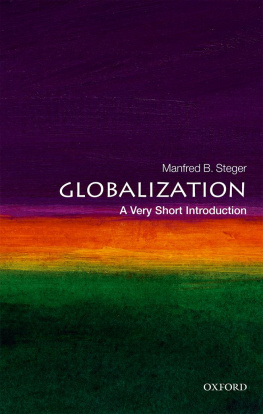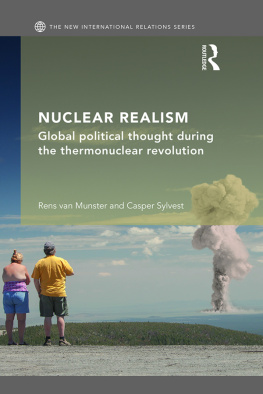The Rise of the Global Imaginary
This page intentionally left blank
The Rise of the Global
Imaginary
Political Ideologies from the
French Revolution to the
Global War on Terror
Manfred B. Steger





To Perle, with love
This page intentionally left blank
Contents
viii
Part I. The National Imaginary
Part II. The Global Imaginary
Preface and Acknowledgments
Neoliberalism. Neoconservatism. Neofascism. Postmarxism. Postmodernism. Postcolonialism.... The remarkable proliferation of conventional "isms" adorned with these two prefixes casts a shadow on the contemporary relevance of traditional political ideologies. As Eric Hobsbawm notes in his magisterial history of the twentieth century, when people face what nothing in their past has prepared them for, they grope for words to name the unknown, even if they can neither define nor understand it.' No longer confined to the ivory towers of academia, this gnawing sense of sailing into uncharted conceptual waters pervades today's public discourse. Add fears of transnational terrorism and global climate change and you get the existential insecurity that has gripped the world in the opening decade of the twenty-first century. And yet, some sanguine voices continue to hail our global age as humanity's best chance to realize the liberal ideals of peace, democracy, and free markets.' For these inveterate optimists, the New World Order that has emerged after the Cold War is still teeming with opportunity-despite the terrible setback of 9/11.
Is there, indeed, something genuinely "neo" about today's isms? Have we really moved "post" our familiar political ideologies and social imaginaries? These are the fundamental questions animating my exploration of an ideological landscape that stretches from the French Revolution to the Global War on Terror. Shuttling back and forth between text(s) and con- text(s), this book suggests that there is, in fact, something different about today's political belief systems: a new global imaginary is on the rise. It erupts with increasing frequency within and onto the familiar framework of the national, spewing its fiery lava across all geographical scales. Stoked, among other things, by technological change and scientific innovation, the global imaginary destabilizes the grand political ideologies codified by social elites during the national age. Thus, our changing ideational landscape is intimately related to the forces of "globalization," defined here as the expansion and intensification of social relations across worldtime and world-space.
The rising global imaginary finds its political articulation in the ideological claims of contemporary social elites who reside in the privileged spaces of our global cities and also fuels the hopes, disappointments, and demands of migrants who traverse national boundaries in search of their piece of the global promise. Thus, the global is nobody's exclusive property. It inhabits class, race, and gender, but belongs to none of these. Nor can it be pinned down by carving up geographical space into watertight compartments that reflect outdated hierarchies of scale.3 The multiple inscriptions and incomplete projections of the global on what has been historically constructed as the national have become most visible in the proliferation and reconfiguration of "community." For this reason, one of globalization's most profound dynamics has been the messy and incomplete superimposition of the global village on the conventional nation-state. At a bare minimum, we are witnessing the destabilization of taken-for-granted meanings and instantiations of the national.
Consider, for example, today's asymmetric wars pitting shifting alliances of nation-states and non-state actors against amorphous transnational terrorist networks that nonetheless operate in specific localitiesusually in "world cities" like New York, London, Madrid, or Delhi. New global pandemics expose the limits of our national public health systems. Nationally framed environmental policies cannot respond adequately to accelerating global climate change. Conventional educational and immigration schemes based on national goals and priorities are incapable of preparing shifting populations for the pressing tasks of global citizenship. Large-scale sports events like the soccer World Cup, originally designed for competing national teams, no longer make sense in a global environment in which the best athletes play for city-based teams, thus pushing their fans' divided loyalties to the limit. And the list goes on.
It is, therefore, all the more surprising to find that our changing ideological landscape has not been adequately described or analyzed in pertinent literature. Well-intentioned attempts to "update" modern political belief systems by adorning them with prefixes resemble futile efforts to make sense of digital word processing by drawing on the mechanics of moveable print. In the past two decades, there have been only three comprehensive attempts to reassess political ideologies. Focusing on the crucial role of electronic mass communication, John B. Thompson's Ideology and Modern Culture sparkles with insights, but appeared a decade too early to assess the full impact of globalization. Michael Freeden's magisterial Ideologies and Political Theory constitutes the most exciting effort in recent times to outline a sophisticated new theory of ideology, but his analytic spotlight rests primarily on the grand ideologies of the national age. Finally, John Schwarzmantel's discerning The Age of Ideology makes a valiant attempt to link ideologies to the conditions of postmodernity and globality, but the author's conclusion-the ideologies of modernity must be "reinvented" to respond to our globalizing world-fails to recognize that these changes are already in full swing.4 However, the failure to redraw our ideological maps appears most glaringly in leading academic textbooks where the grand ideologies of the national age-complemented by various neoisms-continue to be presented as the dominant political belief systems of our time.5
Offering a long-overdue reassessment of the ideological landscape in the global age, this book is based on two general premises. The first is rooted in the assumption that political ideas are not just pale reflections of economics or technology but powerful forces capable of affecting profound social change at the opportune moment. Nevertheless, we must not fall into the idealist trap of treating political ideas as metaphysical entities floating above material practices and social institutions. Neither idealist reductionism nor materialist determinism can capture the complexities of our globalizing world. The second premise is the imperative of reaching out to a broad readership. Hence, this book has been written for both academics with a scholarly interest in the subject matter and general readers keen to explore ideology's journey. My desire to engage both audiences led me to adopt a compressed narrative that unfolds not as a continuous track of historical detail but as a series of linked snapshots that illuminate the "big picture." Settling on such a method is a notoriously risky business, for it is vulnerable to charges of selectivity and simplification. If executed well, however, it allows the author to tell a complex story in accessible language that sacrifices neither analytical rigor nor explanatory power. Adding color, character, and movement to otherwise rather abstract political and philosophical interpretations, it stimulates the generalist without boring the specialist. The reader will be the ultimate judge as to the success of my efforts.

